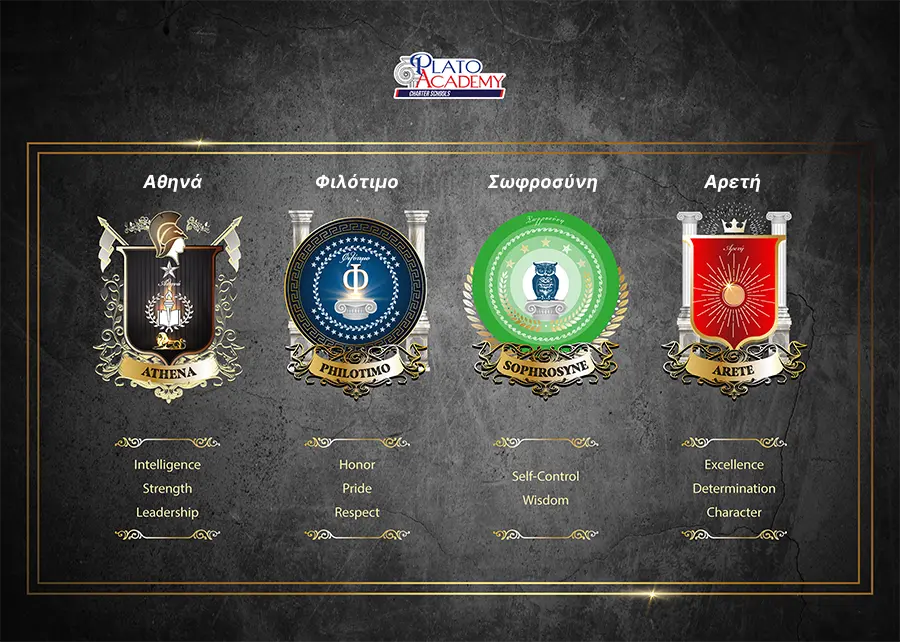
Throughout Plato Academy Schools, we have implemented a system of grouping students and staff into four teams, with members actively contributing to and competing on behalf of their respective teams. The core idea behind this initiative is to foster a sense of camaraderie and unity while rewarding and recognizing positive traits and behaviors among our students. Points are awarded to students for a wide range of qualities and actions that reflect our school’s values. These include demonstrating good character, achieving academic excellence, showing school spirit, delivering outstanding performances, displaying exceptional effort, emphasizing teamwork, practicing humility, expressing compassion, and taking responsibility for their actions. This approach not only encourages personal growth but also promotes a culture of mutual support and encouragement within our school community.
Learn more about the Plato Academy Schools House Emblems
What are the Plato Houses?
The introduction of a house system at our school is designed to create smaller, close-knit groups within the larger school family, fostering a strong sense of belonging and camaraderie among students and staff. Each house embodies specific values and characteristics, encouraging the development of those strengths and qualities.
House events and competitions will provide opportunities for students to engage, have fun, and build teamwork. Students will also benefit from house leaders who shine as examples and role models.
The house system has a rich history, primarily from British schools, but has evolved and been adopted even worldwide. At its core, it encourages camaraderie, healthy competition, and a sense of belonging. You may recognize it from the Harry Potter book series where they have the famous houses (Gryffindor, Slytherin, Ravenclaw and Hufflepuf) or even the Ron Clark Academy in Atlanta, where we visited this summer!
While we are here to teach and learn, we are not just focused on academic success but character development and inclusivity just like stated in our mission! Read more about each house and its meanings below.
Learn More About Each House

In Greek culture, “Athena” (Αθηνά) embodies intelligence, strength, and leadership. As the goddess of wisdom and strategic warfare, she is admired for her intellect, practical insight, and wise decision-making. She represents not only physical strength but also inner resilience and courage. As a disciplined leader, Athena inspires bravery in others and guides with strategic prowess. Additionally, her patronage of the arts and civilization showcases her nurturing role in promoting wisdom, culture, and innovation. Athena’s multifaceted qualities make her a revered and respected figure in ancient Greek mythology.
In Greek, “Arete” (ἀρετή) refers to the concept of excellence, determination, and character. It is an essential idea in ancient Greek philosophy, particularly in the context of ancient Greek morality and ethics. Arete encompasses a wide range of qualities and virtues that are highly regarded and admired in individuals, such as courage, wisdom, integrity, and moral excellence.
The ancient Greeks believed that striving for arete was not only about personal excellence but also about contributing positively to society. It emphasized the development of one’s character and the pursuit of moral and intellectual growth. In the context of ancient Greek literature and philosophy, arete is often portrayed as a noble and admirable trait, particularly among heroes and individuals of high status. The concept of arete remains influential in various philosophical discussions and continues to be studied and appreciated as an important aspect of ancient Greek thought.


“Philotimo” (Φιλότιμο) is a Greek word that is challenging to translate directly into English as it encompasses a complex set of values and virtues. It is a unique and fundamental concept deeply rooted in Greek culture and is often described as an honorable, unspoken sense of duty, respect, pride, and love for others, community, and one’s country.
Philotimo goes beyond individual actions and encompasses a deep sense of morality, integrity, and selflessness. It involves doing the right thing, even when it’s difficult or goes unnoticed. It is an innate sense of honor and responsibility that drives people to act with kindness, humility, and a genuine concern for the well-being of others. In essence, philotimo is about living a life of integrity, showing respect for others, and embodying a strong moral compass. It is a concept that has
been passed down through generations, deeply ingrained in the Greek way of life, and remains a cherished value in Greek society.
In Greek, “Sophrosyne” (Σωφροσύνη) is a term that encompasses the idea of self-control, temperance, and wisdom. It is a virtue highly valued in ancient Greek philosophy and ethics, emphasizing the importance of balance and restraint in one’s thoughts, actions, and emotions.
Sophrosyne involves being mindful of oneself. It is about living in harmony with others, exhibiting prudence and self-discipline. The concept encourages individuals to avoid excess and embrace a balanced and moderate approach to life. In Greek literature and philosophy, sophrosyne is often depicted as an essential attribute of virtuous individuals and is considered a mark of wisdom and moral excellence. Overall, sophrosyne is a virtue that promotes a sense of harmony, inner peace, and self-awareness, leading to a more fulfilled and meaningful life.


Select your campus’ Uniform Store under “Family Resources” and order your house shirts. Please note that they will arrive separately to your child’s school.






